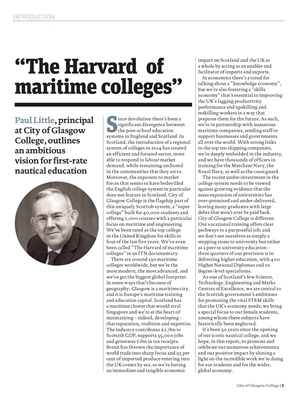
INTRODUCTION
City of Glasgow College | 3
Since devolution there's been a
significant divergence between
the post-school education
systems in England and Scotland. In
Scotland, the introduction of a regional
system of colleges in 2014 has created
an efficient and focused sector, more
able to respond to labour market
demand, while remaining anchored
in the communities that they serve.
Moreover, the exposure to market
forces that seems to have bedevilled
the English college system in particular
does not feature in Scotland. City of
Glasgow College is the flagship part of
this uniquely Scottish system, a "super
college" built for 40,000 students and
offering 2,000 courses with a particular
focus on maritime and engineering.
We've been rated as the top college
in the United Kingdom for skills in
four of the last five years. We've even
been called "The Harvard of maritime
colleges" in an ITN documentary.
There are around 230 maritime
colleges worldwide, but we're the
most modern, the most advanced, and
we've got the biggest global footprint.
In some ways that's because of
geography; Glasgow is a maritime city,
and it is Europe's maritime training
and education capital. Scotland has
a maritime cluster that would rival
Singapore and we're at the heart of
maintaining - indeed, developing -
that reputation, tradition and expertise.
The industry contributes £2.7bn to
Scottish GDP, supports 55,000 jobs
and generates £1bn in tax receipts.
Brexit has thrown the importance of
world trade into sharp focus and 95 per
cent of imported produce entering into
the UK comes by sea, so we're having
an immediate and tangible economic
Paul Little, principal
at City of Glasgow
College, outlines
an ambitious
vision for first-rate
nautical education
"The Harvard of
maritime colleges" impact on Scotland and the UK as
a whole by acting as an enabler and
facilitator of imports and exports.
In economics there's a trend for
talking about a "knowledge economy",
but we're also fostering a "skills
economy" that's essential to improving
the UK's lagging productivity
performance and upskilling and
reskilling workers in a way that
prepares them for the future. As such,
we're in partnership with numerous
maritime companies, sending staff to
support businesses and governments
all over the world. With strong links
to the top ten shipping companies,
we're deeply embedded in the industry,
and we have thousands of officers in
training for the Merchant Navy, the
Royal Navy, as well as the coast guard.
The recent under-investment in the
college system needs to be viewed
against growing evidence that the
mass expansion of universities has
over-promised and under-delivered,
leaving many graduates with large
debts that won't ever be paid back.
City of Glasgow College is different.
Our vocational training offers clear
pathways to a purposeful job; and
we don't see ourselves as simply a
stepping stone to university but rather
as a peer to university education -
three quarters of our provision is in
delivering higher education, with 400
Higher National Diplomas and 20
degree-level specialisms.
As one of Scotland's few Science,
Technology, Engineering and Maths
Centres of Excellence, we are central to
the Scottish government's ambitions
for promoting the vital STEM skills
that the UK's economy needs; we bring
a special focus to our female students,
among whom these subjects have
historically been neglected.
It's been 50 years since the opening
of our iconic nautical college, and we
hope, in this report, to promote and
celebrate our numerous achievements
and our positive impact by shining a
light on the incredible work we're doing
for our students and for the wider,
global economy.